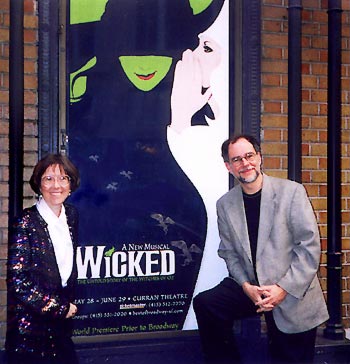Gregory Maguire on Wicked's Music
An interview with Gregory Maguire
Be sure to also visit the Main Maguire page and 50 Wicked-related pages
PHOTO: Carol de Giere (me, MusicalSchwartz.com webmaster) and Gregory Maguire (novelist who wrote Wicked) opening night of Wicked's pre-Broadway trial June 10, 2003, in front of the Curran Theatre.
An E-interview by Carol de Giere
Originally published for The Schwartz Scene newsletter, November 2004
I was in e-mail contact with novelist Gregory Maguire in November when both raves and pans for Wicked the Musical were published. He felt the impact of the "less than positive reviews," not personally, but empathetically on behalf of the songwriter who had conceived the show. "I suspect he has developed a thick skin over the years, but it can't be easy," Maguire wrote. The novelist was irritated at what he considered irresponsible journalism: "Even if they deplored the music, they had an obligation to report what it was...He's done great work for that show and, with perhaps one exception, I think the music is brilliantly complex and tuneful both, and nearly every lyric has a barbed underside."
Maguire is not new to negative press or to misevaluations of his work. He prefers, for example, that his novel Wicked not be called a prequel to The Wizard of Oz, as it's an entirely different vision of that world.
He also disputes the angle that some journalists take on the musical. John Lahr in The New Yorker described the new musical in relation to the film (in which his father, Bert Lahr, played the role of the Cowardly Lion). Lahr wrote: " 'The Wizard of Oz' was dedicated to hope; 'Wicked' is dedicated to irony. Happiness is dramatized as a tyranny, and the Wizard himself is presented not as a charlatan but as a fascist ruling over a principality that does not allow dissent."
While much of the show is ironic, Lahr's review doesn't convey the buoyant optimism that so many theatregoers feel after witnessing the central characters transform into richer human beings. And it shrugs off the benefit of the relevant social commentary.
Maguire is sensitive to Oz version comparisons. He writes, "The description of Wicked as a dystopic view of The Wizard of Oz is not, I think, accurate. Closer to the truth is that Wicked focuses attention on some of the perplexing characteristics of the original story: the lack of opposition to the reclusive and manipulative wizard, the absence of interest in or concern for the Witch, the fact that Dorothy, longing for another world in which her troubles might 'melt like lemon drops,' is instead exiled in a land of dangerous witches, powerful tyrants, and treacherous landscapes. Truthfully, the magnificent song 'Over the Rainbow' might have hung like Marley's ghost over the entire proceedings at the Gershwin Theater. The fact that its absence is neither an indictment nor a glaring omission is the most fitting testimony to the success of Stephen's score.
"When Elphaba sings the bridge in 'I'm Not that Girl,' she is offering the more seasoned rebuttal to Dorothy's lovely fanciful desires. 'I'm Not that Girl' isn't cynical, but it is mature: Ev'ry so often we long to steal/ To the land of what-might-have-been/ But that doesn't soften the ache we feel/ When reality sets back in.
"This is the sadder-but-wiser girl's sung response, across 63 or 64 years, to Dorothy's plaintive request to go abroad and find the grass over there--well, to find it greener."
By January, with WICKED secured as a hit musical and the CD sales reported at 35,000 in the first three weeks, I approached Gregory for any further insights or comments he had about the score. The following is our Q and A session sent electronically between his home near Boston and mine in Yonkers, NY.
Carol de Giere: In your view, what are some of the strengths of the WICKED score as represented on the CD in terms of conveying the emotional journey of the characters?
Gregory Maguire: What impresses me most about the WICKED score is the variety between a certain impactedness and denseness of melodic line, on the one hand, and an airy loopiness on the other. In "No One Mourns the Wicked," for instance, the first phrase is made up of three notes tumbling over each other: "No one mourns the wicked...". The impact, musically, is of tension, a tightly-coiled aggressive energy musically related to the knots of vines that climb either side of the stage, or the interlocked gears of the clockwork stage design. (The tightness of the rhyming scheme enhances this effect, too, with "the good man scorns the wicked" following a few lines later.) Then the melodic line opens up with the first of the score's huge swooping lines for a solo voice, when Glinda sings "Goodness knows..." The earlier "Good news!" with which the play opens, an octave leap, is made sweeter and more plying, more convincing, more seductive when Glinda does the first of her own amazing soprano launches.
Elphaba has her own tricks to sing. "Defying Gravity" is a brilliant song in the way the orchestration keeps supplying a sort of running board of five fundamental notes, an ominous springboard to support the unexpected (and probably devilishly difficult to sing) melodic swoops of Elphaba's revelatory character change. It is almost a kind of yodel--"I think I'll try defying gravity--" and something like a yodel, the vocal line dances up and down at rapid intervals.
I'd be interested in knowing who--if Idina Menzel, or Stephen Schwartz, or the two of them together--devised the final wordless yelp of determination, courage, and anxiety with which that number ends. Again, the melody has become compacted (though very high and triumphant), with the notes sung close together. I don't know anything else like it in the musical theater, that five-note figure that closes the first act.
Finally, of the score I might add that too little attention has been focused on the superb appropriateness of the vaudeville-tinged "Wonderful." It is not just a show-stopper of a routine, with Joel Grey very much in the driver's seat, but it hearkens knowingly back to the days that the original story of The Wizard of Oz first hit the boards. The cast who performed in the 1939 MGM film had all been raised in vaudeville, and made their names there, and the 1939 score--which Schwartz respectfully resists echoing, except perhaps in one cunning figure toward the end--is vaudeville tinged in places, too.
Carol de Giere: How do you respond to "Defying Gravity" as it relates to the Elphaba of the musical and the Elphaba you depicted in the novel, particularly at her turning point after meeting with the Wizard at the end of the Gillikin chapter?
Gregory Maguire: The staging of "Defying Gravity"--and by that I mean the song, the way the moment has arisen out of the Winnie Holzman-Stephen Schwartz iteration of the novel's original plot--makes Elphaba's transformation much more visible. In the cover art of my novel (and indeed in the graphic art advertising the play), the witch's hat is over her eyes, and in a sense this is how I drew the character: always a little bit out of view. To close Act One of WICKED, Elphaba's transformation is, vocally, and theatrically, right in our faces. It is one of the most thrilling moments of the play, and rivals the most thrilling act one finales I've ever seen, and I am a total fan--though it does take some getting used to. I think, "Elphaba, you're a little less shy than you used to be when I first knew you!"
Carol de Giere: Does "For Good" sum up the particular relationship of Elphaba and Glinda as well as transcend it?
Gregory Maguire: The first time I heard Kristin and Idina sing "For Good" at a sing-through performance in New York City, I was amazed at how much feeling they could put into their voices in the first verse--but then we got to the bridge, and I heard where the singers had been heading:
ELPHABA
And just to clear the air
I ask forgiveness
For the things I've done you blame me for
For a story and a score that provides such canny humor and slyness to be willing--and able--to state such bald human emotions without shame or prevarication--well, it is a deeply successful moment in the score, I think, and if the song had sidestepped the direct voice right there, the entire production would have been weakened.
GLINDA
But then, I guess we know
There's blame to share
BOTH
And none of it seems to matter anymore...
More on the music
SCHWARTZ'S ANSWER TO MAGUIRE'S QUESTION: "Apropos of Elphaba's songs: I have been asked if the sort of wordless battle-cry with which she ends 'Defying Gravity' was written by me or something that Idina improvised in rehearsal. It was always part of the song, though of course Idina made it her own and adjusted it to her voice and taste. But it was conceived from the first writing of the song to be the end of the first act, as it remains today."
Visit Idina Menzel page for info about her vocal talents.
Visit Wicked music and Schwartz-Musical-Influences for more background info.
Visit Wicked home page for many other links

From the author of the novel Wicked ...
...comes a new sequel: Son of a Witch.
Read about Wicked Sequel: Son of a Witch
Musicals of Stephen Schwartz:
Music and Lyrics
The Baker's Wife, Children of Eden, Geppetto, Godspell, The Magic Show, Pippin, The Prince of Egypt, Wicked, Working (four of the songs)
Lyrics
Bernstein's Mass, Rags, Disney's Pocahontas, Disney's The Hunchback of Notre Dame.
More Songs by Stephen Schwartz
Reluctant Pilgrim, Uncharted Territory, Butterflies are Free theme song, Life with Mikey "Cold Enough to Snow" (lyrics) (Now on Uncharted Territory, Personals (Music for several songs), A My Name is Still Alice (one song), "Manchild Lullaby" (music), and "Rewriting History" (music) See recordings list.
